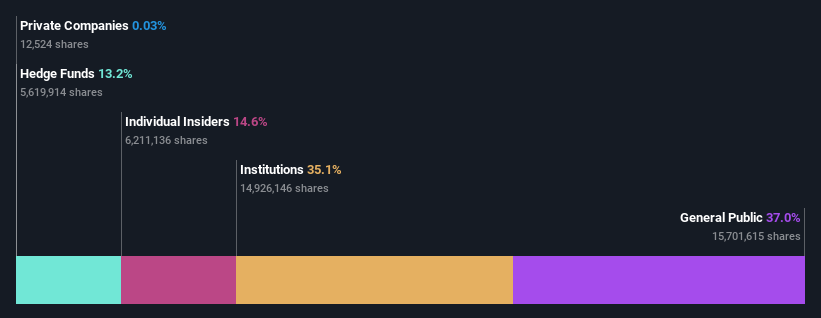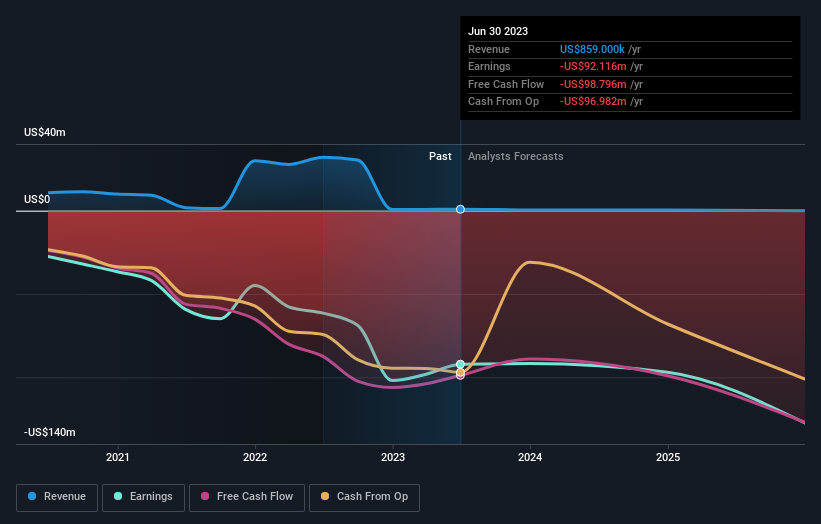Institutions profited after Shattuck Labs, Inc.'s (NASDAQ:STTK) market cap rose US$7.6m last week but individual investors profited the most
Key Insights
Shattuck Labs' significant individual investors ownership suggests that the key decisions are influenced by shareholders from the larger public
The top 7 shareholders own 53% of the company
If you want to know who really controls Shattuck Labs, Inc. (NASDAQ:STTK), then you'll have to look at the makeup of its share registry. And the group that holds the biggest piece of the pie are individual investors with 37% ownership. In other words, the group stands to gain the most (or lose the most) from their investment into the company.
While individual investors were the group that benefitted the most from last week’s US$7.6m market cap gain, institutions too had a 35% share in those profits.
Let's take a closer look to see what the different types of shareholders can tell us about Shattuck Labs.
See our latest analysis for Shattuck Labs
What Does The Institutional Ownership Tell Us About Shattuck Labs?
Institutional investors commonly compare their own returns to the returns of a commonly followed index. So they generally do consider buying larger companies that are included in the relevant benchmark index.
As you can see, institutional investors have a fair amount of stake in Shattuck Labs. This implies the analysts working for those institutions have looked at the stock and they like it. But just like anyone else, they could be wrong. If multiple institutions change their view on a stock at the same time, you could see the share price drop fast. It's therefore worth looking at Shattuck Labs' earnings history below. Of course, the future is what really matters.
It would appear that 13% of Shattuck Labs shares are controlled by hedge funds. That worth noting, since hedge funds are often quite active investors, who may try to influence management. Many want to see value creation (and a higher share price) in the short term or medium term. FMR LLC is currently the company's largest shareholder with 15% of shares outstanding. Redmile Group, LLC is the second largest shareholder owning 13% of common stock, and Josiah Hornblower holds about 7.0% of the company stock. In addition, we found that Taylor Schreiber, the CEO has 6.2% of the shares allocated to their name.
We also observed that the top 7 shareholders account for more than half of the share register, with a few smaller shareholders to balance the interests of the larger ones to a certain extent.
While it makes sense to study institutional ownership data for a company, it also makes sense to study analyst sentiments to know which way the wind is blowing. There are a reasonable number of analysts covering the stock, so it might be useful to find out their aggregate view on the future.
Insider Ownership Of Shattuck Labs
While the precise definition of an insider can be subjective, almost everyone considers board members to be insiders. The company management answer to the board and the latter should represent the interests of shareholders. Notably, sometimes top-level managers are on the board themselves.
Insider ownership is positive when it signals leadership are thinking like the true owners of the company. However, high insider ownership can also give immense power to a small group within the company. This can be negative in some circumstances.
Our most recent data indicates that insiders own a reasonable proportion of Shattuck Labs, Inc.. Insiders have a US$15m stake in this US$101m business. This may suggest that the founders still own a lot of shares. You can click here to see if they have been buying or selling.
General Public Ownership
The general public, who are usually individual investors, hold a 37% stake in Shattuck Labs. This size of ownership, while considerable, may not be enough to change company policy if the decision is not in sync with other large shareholders.
Next Steps:
It's always worth thinking about the different groups who own shares in a company. But to understand Shattuck Labs better, we need to consider many other factors. For instance, we've identified 4 warning signs for Shattuck Labs (2 can't be ignored) that you should be aware of.
If you would prefer discover what analysts are predicting in terms of future growth, do not miss this free report on analyst forecasts.
NB: Figures in this article are calculated using data from the last twelve months, which refer to the 12-month period ending on the last date of the month the financial statement is dated. This may not be consistent with full year annual report figures.
Have feedback on this article? Concerned about the content? Get in touch with us directly. Alternatively, email editorial-team (at) simplywallst.com.
This article by Simply Wall St is general in nature. We provide commentary based on historical data and analyst forecasts only using an unbiased methodology and our articles are not intended to be financial advice. It does not constitute a recommendation to buy or sell any stock, and does not take account of your objectives, or your financial situation. We aim to bring you long-term focused analysis driven by fundamental data. Note that our analysis may not factor in the latest price-sensitive company announcements or qualitative material. Simply Wall St has no position in any stocks mentioned.


